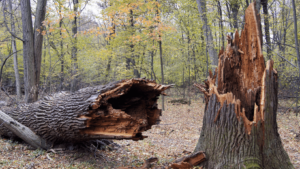On April 25, 2019, the Wynnfield Homeowners Association (HOA) filed a lawsuit against homeowner Karam Muzahem, alleging that he removed a tree from his property without first obtaining the HOA’s permission. The lawsuit was filed by attorney Tom Radcliff of Brady Radcliff & Brown LLP, the same lawyer and law firm that have represented the Wynnfield HOA board in previous legal actions against homeowners. This firm has been involved in a number of contentious cases with residents, raising concerns about the board’s heavy-handed legal approach.
According to then-HOA president Chuck Thuss, the purpose of the legal action was to obtain injunctive relief, a legal remedy that would prevent the homeowner or any other residents from removing trees without following the proper procedures outlined in the Wynnfield HOA covenants. Thuss stated, “The paperwork filed was for injunctive relief to halt the removal of any more trees without going through the proper process, as stated in the WHOA covenants.”
The case is titled WYNNFIELD HOMEOWNERS ASSOCIATION, INC. V. KARAM MUZAHEM ET AL and was filed in the Mobile County Circuit Court.

This case appears to be the first instance in which the Wynnfield HOA has initiated a lawsuit against a homeowner, signaling a shift toward a more aggressive enforcement of its rules. However, the circumstances surrounding the lawsuit have raised significant questions about the board’s judgment and priorities.
Karam Muzahem, the homeowner at the center of the controversy, provided a different perspective. He explained that the tree in question, along with others, posed an immediate danger to his property and the surrounding neighborhood. Muzahem stated that he hired a certified arborist to assess the condition of the trees, and the arborist determined they were rotten, structurally compromised, and at high risk of falling. The arborist strongly recommended their immediate removal to avoid potentially catastrophic damage to the home or injury to residents.
Muzahem expressed frustration with the HOA, noting that the board showed little concern for his safety or the safety of the community. Instead, the lawsuit appeared to be more about asserting the HOA’s authority than addressing a genuine community concern. Muzahem characterized the lawsuit as an example of the board’s overreach and lack of common sense, stating that their priorities seemed focused on control rather than practical problem-solving.
The broader implications of this case reflect a growing dissatisfaction among Wynnfield residents regarding the HOA’s governance. Many residents have criticized the board for prioritizing enforcement and legal action over collaboration and dialogue with homeowners. This incident has become a flashpoint for discussions about the role of HOAs, with some residents questioning whether the association’s actions truly serve the best interests of the community. For many, the lawsuit serves as yet another example of the HOA’s overreach and the adversarial relationship it has cultivated with its members.
